Trogir, Marked by Masters: Traditional A Cappella Singing by Klapa Trogir
March 3, 2020 - TCN meets the modern masters of Trogir in our latest series. Next up, traditional a cappella singing by Klapa Trogir.
In November 2019, Trogir unveiled a new branding strategy, visual identity, and promotional video, becoming the first coastal destination in Croatia to use branding at such a serious and professional level.
The result of the creative process is the slogan “Marked by Masters”, influenced by the continuity of life in Trogir for over 3600 years, the great masters who have operated in Trogir since the Middle Ages, and the indelible traces that these masters leave.
While the medieval master builders, sculptors, and stone-cutters who lived and created in Trogir left their mark through the traces of graffiti around the town, centuries later, we can find Trogir’s modern masters thriving as artists, chefs, jewelers, tailors, and klapa singers, to name a few.
Today, we meet Klapa Trogir, whose traditional a capella folk songs have decorated the squares of Trogir for over half a century.
The narrow arched streets, beneath the Romanesque, Gothic and Renaissance windows and balconies of ancient Trogir, have always echoed the songs of heavyweights, fishers, and sailors. The catchy or rustic tunes marveled wonderfully at the city's turbulent past. These Dalmatian folk tunes originate from the everyday life of a coastal man whose traces are rooted in the centuries-old singing of folk fraternities of medieval churches. Thus, 56 years ago, Klapa Trogir klapa was borne out of the same environment.
Klapa Trogir was founded in 1964, at the premises of the Kolo Cultural and Art Society, which has cultivated the rich tradition of the Trogir choir since its foundation in 1919. Formed by friends and folk singers who first called themselves 'Grupa Dalmatinaca', they were one of the first formally formed vocal bodies of Klapa founded in Dalmatia.
Hoping to prove themselves at the first-ever Omiš Klapa Festival in 1967, Grupa Dalmatinaca needed to change their name in order to perform. After contemplating many stage names, "Oktet Trogir" was accepted.
Oktet Trogir performed folk tunes “Cviće moje”, “Ako si pošla spat” and “Blago, blago” and was awarded the second-largest cash prize by the jury.
A long-time member of the jury, distinguished historian and cultural worker Željko Rapanić reviewed their performance in Slobodna Dalmacija:
"... in the great flood of fabricated pseudo folklore and folk music, nurturing the original Dalmatian song as a musical expression of a particular and independent ethnic medium and ambiance has its deep meaning ... in this sense, we would emphasize Oktet Trogir..."
For the next 20 years, Klapa Trogir confirmed its quality by winning twenty awards from the Omiš jury or audience - and in 1986, Klapa Trogir was voted the most successful klapa for the first two decades of the Festival.
Klapa Trogir was conducted by leading music experts of the time, like Josip Veršić, Silvije Bombardelli, Nikolaj Žličar, Nikola Buble, Ljubo Stipišić, Joško Ćaleta, Duško Tambača, and Vladan Vuletin to name a few.
The size and merit of Klapa Trogir is that by its quality of singing, and especially by its relation to the singing tradition of its region, it has been able to prove its worth at an almost academic level, while preserving traditional songs, which they then recorded and released. Today, the songs are essential literature for any aspiring klapa singer.
The sound of Klapa Trogir, special and inimitable, is the soundtrack to scenes of ancient Trogir, the cathedral and busy squares, parks and terrace gardens, and dawn or dusk reflected on the calm sea.
Some say that Klapa Trogir can thank its harmony from the singer's brotherly bond, which often corresponds to the truth. Namely, from the beginning, the group once boasted brothers Geić, Frana, and Coce.
At the zenith of its Klapa voyage, Klapa Trogir ceased to operate in the first half of the 1990s. After a ten-year hiatus, in 2003, they reunited briefly to celebrate 40 years with performances at Poljud, Lisinski and other concert venues across Croatia.
Behind Klapa Trogir is a magnificent opus of Dalmatian folk songs, new klapa compositions, modern popular festival songs and world, classical and sacred compositions of international provenance.
Last summer, Klapa Trogir reunited to take part in the Trogir Cultural Summer program.
"I am delighted to have revived the Klapa song after 30 years in Trogir. We proved that the songs did not die in the city, and that many of our vocals will be performed forever. A lot is going on in Klapa songs nowadays, and you can find yourself singing in odd places, from funerals to weddings, or theaters to stadiums, and the least are sung in streets or alleyways. We think that this should be indigenous singing, it is simply that charm that cannot be extinguished and what made the Trogir Klapa famous," said Klapa Trogir member Igor Brešan.
Their last concerts were very well received and were designed in three parts. While they most sang a capella, and songs belonging to the locality of Trogir, in the second part, they presented the fun songs of Zdenko Runjić in klapa versions, and in the third, dedicated songs to people who were gone, primarily Nikola Buble and Vinko Coce.
"The concerts were very well received by the audience. There is no makeup artist here, it is sung simply without a microphone, as in the aforementioned streets, very dignified. In the 55th year of existence, we were given a stable team of 10 people who received their first recognition from the President, then we toured in Ljubljana and Čakovec, and now we are going to Norway. The voice of Klapa Trogir really spreads nicely."
At the end of last year, they released a forgotten recording found somewhere in Split, including nine songs that have never been released in over 30 years.
Over the past decades, the Klapa has been enriched by top tenors such as Nikša Bilić Panto in the first line-up, with his seconder, Špire Piteša, and in the second it was Vinko Coce and Zoran Demirović - Čuči. Today, there is Ivo Ostric and Ivo Coce, who will carry on the work of the klapa. The album of lost songs is event nominated for a Porin award - in three categories!
Many young singers grow up listening to these Trogir tenors and baritones, trying to copy the unique performances of Klapa Trogir. The wonderful voices and interpretations of Vinko Coce, Zoran Demirović - Čuč, Duje Coce, Mario Franić, and Frane Frana, Marinko Rožić and Vlado Rilja, the most famous singers of Trogir, will remain an unattainable model and lasting value of Dalmatian musical tradition.
To read more about the modern masters leaving their mark on Trogir today, as well as the latest from this gorgeous UNESCO World Heritage Site, follow the dedicated TCN Trogir page.
Source: FDK.hr, Trogirski Portal
Chops Grill Says Goodbye to Winter, Hello to Spring by Returning with New Chopsylicious Menu
March 3, 2020 - Chops Grill reopens on Tuesday, March 3!
After a short winter break (which felt like an eternity), Chops Grill is back from their hibernation and ready to rumble with a brand new Chopsylicious menu just in time for the spring season.
If you’re a newcomer to the wonderful world of Chops Grill, listen carefully…
Chopsylicious is a tried and true, three-course mix-and-match menu of the restaurant’s classics, with the total price reflected in the main course you choose.
So, what’s on offer this time around?
From Tuesday, March 3, 2020, restaurant-goers can choose from a starters selection of Vichyssoise soup of leek and potato, tuna belly carpaccio with shallots and a rocket salad with pomegranate and citrus, the crispy panzanella salad with skuta cheese and whole grain mustard dressing, or steak tartar.
For main courses, it’ll be hard to choose between the beetroot risotto or seafood spaghetti with squid ink sauce and local wild herbs, and that’s without mentioning the list of meat dishes on the menu.
For instance, the supreme chicken is served with seasonal vegetables and potato puree, while the beef, vegetable and plum skewers are accompanied by potato wedges. The grilled rump steak is filled with bacon and cheese, the beef wellington is wrapped in mushroom, onion, foie gras sauce and fresh black truffle, while you can never go wrong with the classic T-bone steak.
Because no meal is complete without dessert, Chops has pulled out all of the stops this spring, offering guests the fruits of forest crème brûlée, semifreddo, chocolate brownie with vanilla ice cream or the traditional rožata (egg flan) with lavender, rose, and Chantilly cream.

Chops Grill is now open every day from 12 pm to 10:30 pm.
For reservations and more info, email This email address is being protected from spambots. You need JavaScript enabled to view it., visit their Facebook page, or call +385 91 365 0000. You can also visit their website here.
To read more about lifestyle in Croatia, follow TCN’s dedicated page.
Zagreb Homeless Shelter to Close Because of Croatia Government Inaction
March 2, 2020 - Zagreb's homeless population could soon lose the roof over their heads. The only homeless shelter in Zagreb, which offers various forms of practical help and advice, is about to be closed permanently unless the Croatia government acts soon.
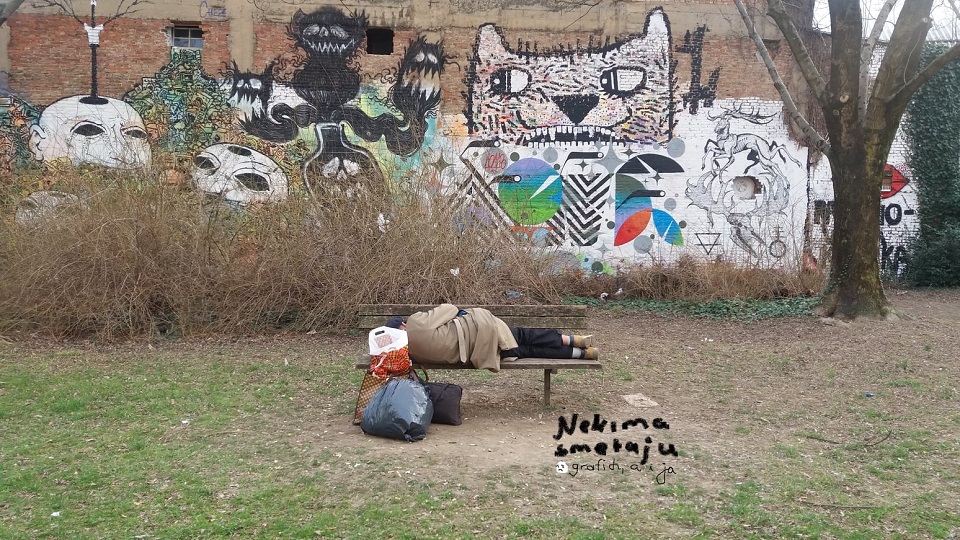
Homeless in Zagreb | HMB Facebook
Most Homeless Shelter Users Come from Slavonia
"This is the only place I can come without money and have coffee, get on the computer if I need to, or just warm up when it's cold… it’s the only place,” explains a younger user regarding his visit to the Homeless Assistance and Support Centre on Branimirova Ulica 53 in Zagreb. He is originally from Slavonia and, as he pointed out, would not know how to survive in Zagreb without this shelter, which is part of the Hrvatske mreže za beskućnike (Croatian Homeless Network).
"Because it's a relief to know that I can always come in from off the street if I need to or want to. Besides, we can also borrow a sleeping bag here or seek advice. It would be a big blow if they close the centre – for myself and many others,” he added.
Zagreb Shelter Will Close in Three Months: Contract Expires
As reported by Igor Lasić/DW on March 2, 2020; the Zagreb shelter's three-year contract with the government expires in three months. Therefore, by law, they will have to move out of their rented space. A new competition for a grant has not yet been announced. Even if it occurs in the meantime, it will be almost impossible for the rest of the procedure to be completed before that deadline. In reality, the work of the shelter can only be sustained by a gesture of extraordinary grace by the Government of Croatia, or the competent Ministry for Demography, Family, Youth and Social Policy.
"I found out about this shelter through Facebook. I’m from Slavonia and could not exercise my rights as a child of a war veteran, so I had to leave. The biggest advantage of this shelter is that it helps people find jobs. There is also a housing community, so that some people can find temporary accommodation here as well," the Slavonian continued.
The homeless young man has worked several jobs since, like food delivery and similar, but never for long. He has also worked abroad in entry-level construction jobs but said that he has faced various setbacks. He does not speak any foreign languages, so he cannot not even seek protection or better opportunities.
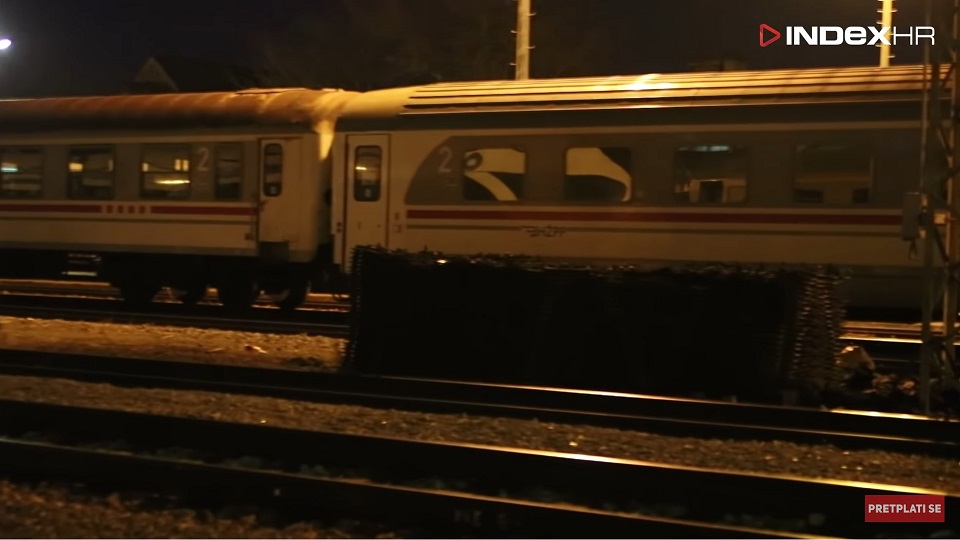
About 50 to 70 homeless live in abandoned railroad cars at the Zagreb Glavni Kolodvor according to HMB | Index YouTube
Thirty Visitors Per Day in Winter, 352 Registered Users
"Over twenty people come to our shelter daily, on average, and more than thirty in the winter, but we have a total of 352 registered users. Some just come for coffee, some for legal or other advice and some participate in our educational workshops. We also help users with finding a job, which is extremely important for re-socializing the excluded members of our society. But our best program is the residential community. In one apartment we have enabled a total of 32 younger users to become more independent over time and resume life from a more stable starting point. It is difficult for us, who have always had housing, to understand how important this is,” Slavko Mađor, manager of the shelter, revealed.
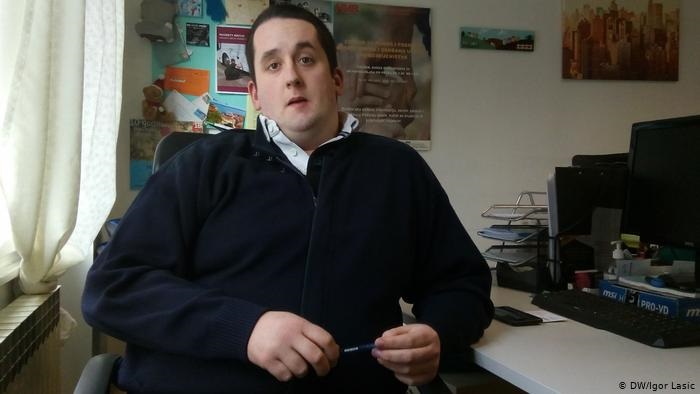
Slavko Mađor | DW Igor Lasic
"It is difficult for us to understand what it’s like when someone has to sleep in a public booth and then goes to work every day from there. Or how a person becomes homeless. Well, even my mother was surprised and asked me how this could be," explained Mađor.
Another user was from Zagreb. He did not want to be photographed or have his name published. With their permission, two other users were photographed at computers while working, but only from the back. It's not hard to grasp the backlash from publicity. An elderly lady sat in the entry, avoiding eye contact. Another entered the shelter and spoke to Slavko Mađor in English. She's French and has been coming for a while, and nobody knows what kinds of challenges she’s dealing with.
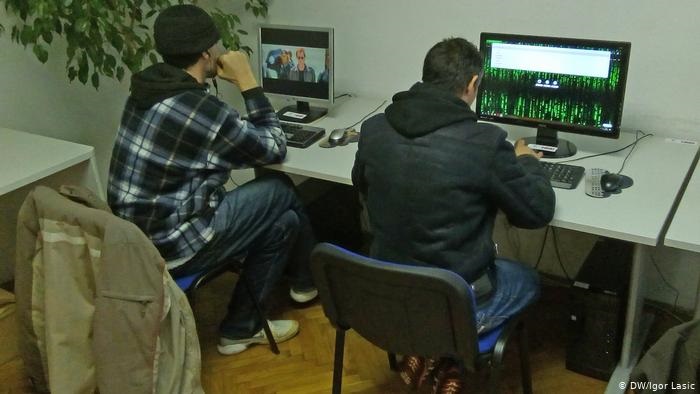
Zagreb Shelter Users | DW Igor Lasic
Shelter Offers Help, Food and Accommodation
"In a situation like this, it means a lot when people know that someone is available and willing to pay attention to them, let alone help with something else. This is more meaningful than just food and accommodation," summed up the man from Zagreb. He claimed to be 42 years old and is looking for a job after a temporary one ended, which he obtained through the shelter.
"In any case, I am not officially registered as a homeless person, but that is only because I can sleep with a friend in Velika Gorica right now," he explained.
"I used to be a waiter but now I’ll take any job I'm offered. And while I’m waiting, I’ll stop here and warm up, eat a sandwich, spend time at the computer and talk to people. We can talk like real people without fearing that someone will judge us because we are in a situation like this,” he added.
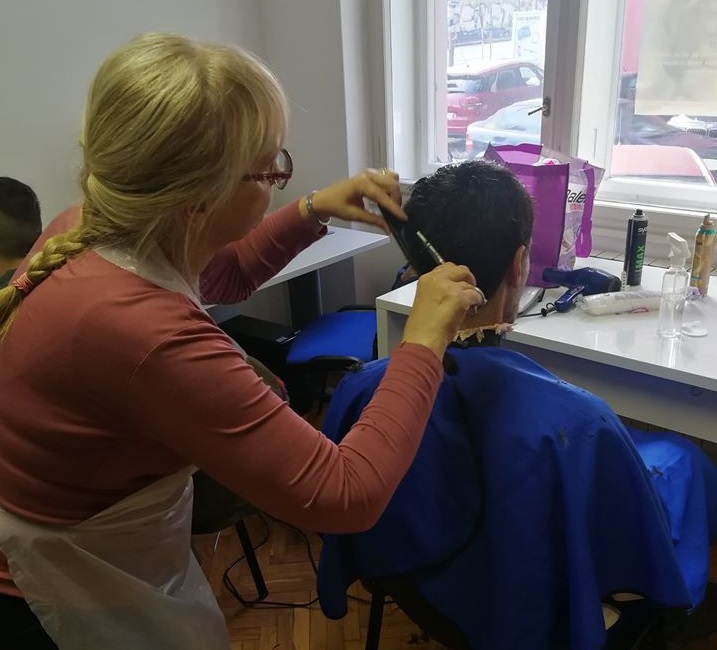
HMB Facebook
Only Homeless Shelter in Zagreb
The Homeless Help and Support Centre is just that: a place where the homeless can obtain help and necessities beyond just a meal or shelter. There aren’t any other facilities like this in Zagreb. And this is where the existentially afflicted from all over Croatia wind up. Most of them come from Slavonia because not only does Slavonia have the lowest standard of living and the weakest labour market; it also have the weakest social welfare system. But now the survival of this lone refuge is endangered, or at least extremely uncertain, until the government is willing to act.
Those who rely on this shelter to meet their essential needs and better their situation need not be left with a parting courtesy of hoping to meet again one day in the same place. In any event, upon vacating the building at Branimirova Ulica 53, at least the shelter will not have to remove their sign from the facade near the entrance, even if they must move out. It has already been removed, at the request of the occupants of the building, who own their homes.
Index Profiles Zagreb Homeless Man
Follow our Politics page for updates on this story and the challenges of the homeless population in Croatia. More information about the Hrvatske mreže za beskućnike (Croatian Homeless Network) can be found on their website here and Facebook page here.
VIDEO: Croatia to Brazil - Drazen Grgic Sails to Fernando de Noronha
As Morski writes on the 2nd of March, 2020, Drazen Grgic had a mission to cross the Atlantic alone and get from Croatia to Brazil, more specifically to the Fernando de Noronha islands from the Dalmatian city of Sibenik.
Sibenik-based ophthalmologist Drazen Grgic has finally succeeded in his plan! He spoke to Morski about his adventures.
Via Croatia's stunning Kornati archipelago, Drazen Grgic's goal was to sail to the Fernando de Noronha islands off the coast of Brazil and back, and these two points were not merely chosen by chance, as they are probably the two most beautiful maritime national parks in the world, and their symbolic connection (from Croatia to Brazil) is intended to raise people's general awareness of marine conservation.
''You kind of lose your sense of time because you sleep when you arrive. Day and night are the same for you, you just look at what the wind is like. You listen hard to everything because every sound means something. I won't say that the navigation was easy, but thank God there were no major difficulties,'' Grgic told Morski and continues:
''The most challenging part was the part near the equator, the so-called Doldrum. There, all the forecasts were off the mark, and I went according to the situation as it was and the stories of more experienced people and it went well. It's a strong sea and it takes a lot more power to pull a ship through the waves, at least 20-30 percent more power than you'd need on the Adriatic. This automatically means that you're so much slower,'' added Grgic as he discussed his intrepid journey across the open sea from Croatia to Brazil.
''Sailing along Africa, where I was about 50-100 nautical miles offshore, I was surprised with the amount of fog and humidity in the air, later, along the shores of the Western Sahara and the sand that covered the ship like powder. There wasn't much sun. It was only from Cape Verde that the air cleared and we finally got some sun, but then it burned over 30 degrees. Still, it's a faster transition from one climate to another,'' recounts Grgic.
''I didn't see any monsters, I saw a lot of dolphins, two whales, one shark, a lot of dangerous Portuguese man o' war (marine hydrozoan). Flying fish were jumping on board and there were even squid near Africa! Here in Brazil, these Fernando de Noronha islands really look like they're from the pirate-style stories of the tropics. They're overflowing with greenery, I'm anchored in a bay where a waterfall flows from one cliff down into the sea.
The people here are very cordial and although I know almost no Portuguese and they speak very little English, we manage to communicate very well. I'm going to relax for a couple of days and rest, check the boat and then back to the middle of the Atlantic sea to the Azores, and then in about a month or two, I'll be in Sibenik,'' explained Grgic.
Make sure to follow our lifestyle page for more on Drazen Grgic's journey from Croatia to Brazil and back.
66% of Croatian Companies Affected by Coronavirus Outbreak
As Novac writes on the 2nd of March, 2020, as many as two-thirds of Croatian companies are already experiencing the negative effects of the current coronavirus outbreak in their business operations, and more than 50 percent of them have experienced a fall in turnover, according to a poll by the Croatian Chamber of Commerce (HGK). Travel agencies, accommodation, food preparation and logistics companies are among the hardest hit, and small and medium-sized Croatian companies are feeling more of a negative impact than the larger ones.
''HGK immediately communicated the problems with crossing the border reported to us by transporters from the field to the Civil Protection Headquarters of the Republic of Croatia, and their prompt response saw it resolved in one day. We'll continue to listen to the voices of businessmen and work to make this situation affect their business as little as possible,'' said Luka Burilovic, President of the Croatian Chamber of Commerce, he then urged entrepreneurs and owners of Croatian companies to continue to report any business problems they encounter to HGK.
Most Croatian companies have reported difficulties in contracting new jobs, completing contracted jobs and renewing existing jobs, and there are also various problems with transporting goods, cancelling participation in international fairs, congresses and events, and reduced demand for products and services here at home on the Croatian market.
In addition to all of the above, 75 percent of Croatian companies expect a short-term negative impact owing to the coronavirus epidemic, with 15 percent expecting the virus to have a strong impact on their businesses. More worrying still, as many as 82 percent of Croatian companies expect long-term negative consequences.
The most pessimistic are those Croatian companies whuch are already feeling the dire consequences, again with travel agencies leading the way, as they expect the strongest effects on their long-term business.
As many as 92 percent say they expect strong and medium-term negative effects on their long-term operations, and 62 percent expect that negativity in the short-term. The following are Croatian companies in the business of providing accommodation preparation and serving food (hotels, resorts, camps, other accommodation types, as well as restaurants and cafes), of which 76 percent expect long-term and medium-term negative impacts on business in the short term.
The HGK survey also showed that in wholesale and retail, short-term effects are expected at a level of 38 percent, while 55 percent of Croatian companies operating within that sector expect long-term effects, and there are sectors that don't anticipate strong short-term effects, but do expect problems in the long run. These are primarily mining, quarrying and administrative and support service activities (such as leasing companies), but also those who operate in the education, professional, scientific and technical sectors, as well as those in the real estate, financial, construction, and IT sectors.
Make sure to follow our dedicated business page for more on Croatian companies and the effects of coronavirus in Croatia.
Croatia Migrant Crisis: Interior Minister Will Not Send Army to Border
March 2, 2020 - Davor Božinović, the Interior Minister of Croatia, emphasised that there is no need to send the army to the border, because Croatia deals with illegal migrants daily. He added that Croatia’s border protection system maintains communication with colleagues from other countries on every level. And they are working together to pursue a diplomatic solution.
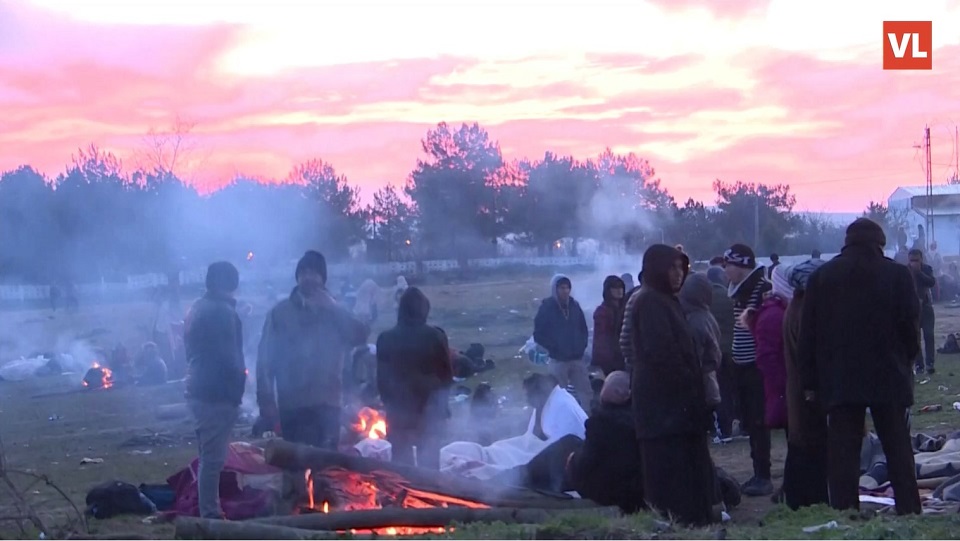
Croatia Eastern Border: No Increase in Illegal Migration
“There has been no reported increase in illegal migration on Croatia's eastern borders. The police are doing their job and the situation is no different than yesterday or the day before. Croatia has been dealing with illegal migration every day for almost three years now. That is why, even with these new circumstances, we can confirm that our border protection system fully operational and doing its job,” Interior Minister Davor Božinović said today. He noted that presently there is no need to send the army to the Croatian border, even though that remains a legal possibility, according to Marina Borovac/Večernji List on March 2, 2020.
“We will see how the situation on the Greek and Bulgarian borders develops, in relation to Turkey’s recent actions (release of migrants from their country). We are in close contact with our colleagues (from other countries) on every level. One direction we are going is certainly the diplomatic route. After all, the President of the European Council, the President of the European Commission and the President of the European Parliament will visit the Greek border tomorrow to see the situation there. At the same time, talks are underway with the Turkish leadership, which is part of the diplomatic role. The aim is to return to the EU-Turkey agreement of 2016,” Božinović added, and is confident that diplomacy would be the goal.
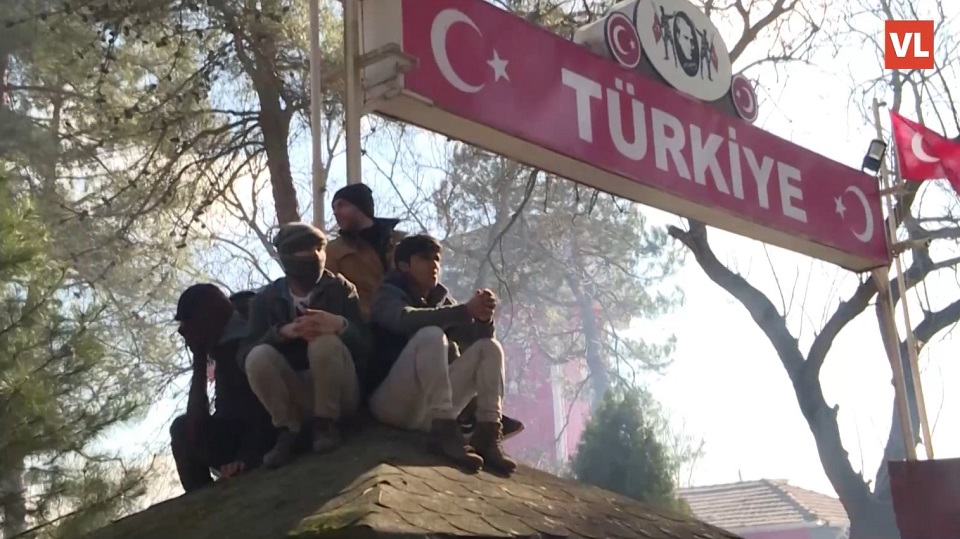
Croatia Will Discuss Border Assistance to Greece, Bulgaria
Božinović announced an upcoming meeting of European interior ministers to discuss what assistance can be sent to Greece and Bulgaria. He says both countries are committed to deterring illegal migration, which is in the wake of the new European Commission's policy regarding the protection of the EU's external borders. Božinović recalled that there was a migrant wave in 2015 because Greece had allowed migrants to pass through their territory.
“This is the only way to prevent the 2015 and 2016 scenario from happening again. Today, not only Greece, but every country has made their objectives very clear regarding the protection of their borders along the so-called Western Balkan route,” the interior minister concluded.
Croatia will emphasize its plight with protecting Europe's borders, but reiterates that the issue of the migrant crisis can only be resolved through (the agreement upon) a common European policy.
Follow our Politics page and this page to keep up-to-date on the migrant crisis along the Western Balkan route in Croatia.
Milanović: Most Migrants Won't Reach Europe
ZAGREB, March 2, 2020 - A very small number of migrants will manage to reach Europe, and tensions caused by this matter will decrease in the coming days, Croatian President Zoran Milanović said after meeting with his Austrian counterpart Alexander Van der Bellen in Vienna on Monday.
"It is precisely because of what we as Europe went through nearly five years ago and what has been done in the meantime that it is impossible for a refugee wave of that scope to occur again, it is simply physically impossible," Milanović said, referring to 2015 when over a million refugees had arrived in Europe from the Middle East.
"What we are seeing is a political struggle and manipulating with people," he said and added: "I dare predict that a very small number of people will manage to break through the barriers" and "tensions will calm down within a few days."
Milanovic said that in 2015, when he was prime minister, "certain lessons had to be learnt", and that today it was simply not true that migrants currently staying in Turkey were in danger. He noted that the rules of international humanitarian law needed to be respected.
Van der Bellen said that the border countries such as Greece and Bulgaria should not be left in the lurch in that regard, adding that he did not know what Turkish President Recep Tayyip Erdogan actually wanted to achieve by opening the border to Europe for migrants.
Erdogan said in Ankara on Monday that European leaders were now calling him to discuss closing the border, but that it was too late for that now and that the path to Europe would remain open.
"There will be talks with Turkey to see what they actually want," the Austrian president said, adding that Europe would continue to face the problem of illegal migration as long as the situation in Syria does not change.
More news about the migrant crisis can be found in the Politics section.
Parliament Continues Working After MP Reports Contact with Coronavirus Positive Person
ZAGREB, March 2, 2020 - The parliament is continuing to work in a regular manner and without any changes after one of the 151 members of the legislature stated that he would be in self-quarantine as a precaution since he had been at an event at which one of the eight Croatian patients diagnosed with coronavirus had also attended.
In response to Hina's queries about the latest developments after parliamentarian Joško Klisović informed the public that he would be self-isolated in the next 14 days, even though he participated in voting in the parliament on Friday, parliament's public relations office said that there will not be any disruptions to the parliament's regular work.
The national parliament responded that no other deputy has reported that they had come into contact with any of the people tested positive for coronavirus.
To date, five positive cases have been registered in Rijeka and three more cases in Zagreb.
More news about coronavirus can be found in the Lifestyle section.
150 Million Kuna Loan Guarantee Signed for Pula Hospital
ZAGREB, March 2, 2020 - A 150 million kuna loan guarantee agreement was signed on Monday to help the Pula General Hospital, the largest health institution in Istria, to settle its long-term obligations.
The signing ceremony was attended by Prime Minister Andrej Plenković during a day-long visit to Istria County.
At its session held last November, the government pledged an additional HRK 150 million to support the construction and equipping of the new hospital in Pula. The state guarantee secured a loan for that purpose from Erste & Steiermärkische Bank.
HRK 600 million was previously secured through two loans for the new construction of the new hospital in Pula. A co-funding loan agreement was signed in July 2011 by the government, Istria County and the Pula General Hospital, under which the central government was to cover 75% of annuities and the county government the remaining 25% throughout the repayment period.
Because of the changes that had occurred during the construction, notably to improve project solutions by applying state-of-the-art technologies in medicine, it was necessary to ensure an additional HRK 150 million.
"The additional funding does not mean the investment has increased in relation to the plan. Under the 2011 agreement, the planned cost of the entire project with construction and equipment was HRK 800 million, and we will reach HRK 750 million," Pula General Hospital director Irena Hrstić told Hina.
More Pula news can he found in the Lifestyle section.
Place2Go International Travel Show to Be Held in Zagreb on 13-15 March
ZAGREB, March 2, 2020 - The ninth international travel show Place2Go will take place in Zagreb's Arena sports hall on 13-15 March, with over 200 exhibitors from some 20 countries expected to attend, slightly more than last year, the organisers announced at a press conference on Monday.
"This year is particularly challenging because of the coronavirus situation, but for now everything is going as planned. We have had one cancellation only, by Macedonia, because they are following the recommendation not to travel abroad," the travel show's director Damjana Domanovac said, adding that they were in close contact with the national coronavirus crisis management authority.
She said they expected about 230 companies to attend the show, compared with 210 last year, mostly from Croatia, Slovenia, Austria, Serbia, and Bosnia and Herzegovina. "This year new exhibitors are Argentina, Cuba, Montenegro and Albania, who will present their destinations. Exhibitors from Indonesia and India will be present this year as well through their respective embassies."
Domanovac said that this year there were no exhibitors from Italy, China and other countries with large numbers of coronavirus cases. She added that following the cancellation of the world's largest travel show ITB Berlin, the Place2Go fair would be a good chance for professional visitors from Croatia and the region to establish new contacts and close new deals.
More tourism news can be found in the Travel section.

